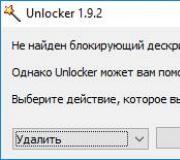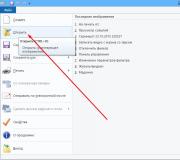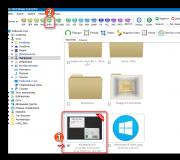Virus in iPhone 5 what to do. Do you need an antivirus for iOS devices?
Due to the fact that Apple smartphones begin to freeze and glitch over time (as well as all other similar equipment), the question of how to clean the iPhone is looming. Sometimes it also occurs before the device is sold.
We'll walk you through the process iPhone cleaning from cache, from garbage, unnecessary files and so on.
1. Clear the cache
Each application, as you know, has its own cache and you can delete it for each program one by one. But it is much easier to remove it completely, for the entire phone.
To do this, it is best to use the Battery Doctor program or any other software for cleaning your smartphone (there are quite a lot of them). After downloading, just go to the “Junk” tab and click on the “Clean up cache” button. After that Battery Doctor will check the entire system for the presence unnecessary cache and will remove it.

Advice: Further clean Safari cache. In some cases, cleaning programs various reasons do not affect this application, so it is better to clean it manually. To do this, open the “Safari” item in the settings and select “Clear history and website data.”

2. Removing viruses
To clean your device from viruses, you can use one of the following antiviruses:
In most cases, the program itself will prompt you to scan for viruses after installation. If this is not the case, then there is always a check item in the main menu. All you have to do is click on it.
For example, in Avira there is a “Scan” button on the main “Antivirus” tab. Everything is quite simple, as in other programs from the list above.

3. Delete applications
To free up phone memory, be sure to view the entire list installed programs– perhaps you no longer need some of them and can be freely deleted.
Most likely, you do not use half of the installed software regularly or do not use it at all. Accordingly, it is better to remove unnecessary applications. You can install them back at any time if you need them again.
As you know, to delete applications in iOS, you just need to hold down its shortcut on the desktop, and then click on the cross.

There is a small life hack that concerns applications in iOS. It consists of reinstalling them. After this, the volume of each program is significantly reduced.
Therefore, if you really need some program, delete it and then download it again from App Store.

Clue: Re-adding mail also helps. To do this, go to settings, open Gmail (or other mail client) and delete it, then add it again.

This is due to the fact that any email client saves a huge amount of garbage from letters (images, attached files, etc.) during its operation. You need to get rid of all this.
4. Delete photos and unnecessary files
You should do the same with photos and files - look through them all to see which ones you need and which ones you haven’t opened for a long time.
As for photographs, they are deleted as follows:
- In the Photos app, tap one photo in the general list.
- It will be possible to put a check mark on those pictures that will be deleted or with which other actions will be performed. Select those that are not needed with ticks.
- Click on the trash can icon in the lower right corner of the screen.

In the same way, you can get rid of unnecessary files - go to the file manager and delete them all.
If you really need all the photos and files, use cloud storage, for example, iCloud.
5. Complete erase
In some cases, when none of the above helps, all that remains is to completely erase all files on the system.
Before performing this procedure, save all important files in the cloud, on a flash drive or in computer memory. After that, go to settings, select “General”, and then “Erase content and settings”. Another one will appear small window“Erase iPhone”, click “Erase” in it.
This procedure is performed in the same way on an iPad.

Thanks to these simple actions You can remove everything unnecessary from your device.
IOS-based mobile devices are among the most secure. The whole point is that the file iPhone system is closed from viewing, which means that no virus can harm the mobile device (if the factory firmware). If the owner of such a device has flashed the phone or installed programs not only from the official website (AppStore), then the likelihood of viruses getting onto the phone increases significantly.
Of course, there are ways to check your mobile device for viruses. This can be done either using an antivirus software, which is already installed directly on the user’s computer, or using special antiviruses for iPhone.
Checking using a personal computer
In the first case, you need to connect your mobile device to personal computer via USB. After the computer detects it, you can launch the antivirus installed on the PC and run a scan of the removable drive (phone memory card). At the end of the scanning procedure, the antivirus will show the user all the vulnerabilities found and the malicious software found. Of course, this method is not the most convenient. The best thing is to download antivirus software for your mobile device from the AppStore and install it.
Antiviruses for mobile devices
There are several most popular options, these are: Intego VirusBarrier X6, ESET Cybersecurity, Panda Antivirus, Norton AntiVirus. Each of them has its own advantages and disadvantages.
Intego VirusBarrier X6 scans most archives and attachments, scripts, detects and restores damaged data, and malicious software. The main advantage of this antivirus is that it scans quite quickly. ESET Cybersecurity is not capable of cleaning archives and attachments, but fortunately this software protects the user while surfing thanks to special anti-phishing features. Among the main disadvantages is that, unlike the previous option, ESET Cybersecurity works quite slowly. The functionality of Panda Antivirus and Norton AntiVirus are approximately the same, the only difference is the cost of these applications. It is worth noting that owners of computers with operating MAC system can also use these antivirus programs.
If you use the Internet a lot and quite often, you, without your desire, become an easy victim for all kinds of worms, Trojans, malware and other viruses that live in global network. The myth that a virus can only be purchased on untrustworthy sites has long been unjustified. Your computer can become infected even while you are viewing the news or watching a sports match. Here are some simple tips on how to protect yourself from this.
Instructions
Ensure that your computer remains constant by installing one of the special antivirus programs on it, which will allow you to protect your computer and at the same time check it for threats at any time. The installation will also allow you to monitor malicious sites, check downloaded files, detect new viruses, and place especially important sites under personal control.
Download if you can't afford it yet paid versions. Many free programs that float on the Internet do an excellent job of protecting your computer no worse than their commercial counterparts. Update the database as often as possible, do general checks at least several times a month, and your computer will be completely protected.

Use on-line antiviruses if you don’t want to bother with installing new programs. Just use a search to find a site that provides services for finding and removing viruses from your equipment and diagnosing it.
Video on the topic
Testing antivirus applications using virus programs usually performed by developers in special laboratories. However, such a check can also be carried out at home using a specially created pseudo-virus that is not capable of causing harm to the computer.

You will need
- - EICAR Standard Anti-Virus Test File
Instructions
Open the page in your browser http://www.virusbtn.com to log in to the Virus Bulletin website.
Fill out the fields required to register and wait until you receive a message asking you to confirm your registration by email.
Go to: www.eicar.org/anti virus test file.htm to open the page of The European Institute for Computer Antivirus Research and download the test virus created by the company’s specialists. This pseudo-virus does not contain program code and cannot harm the computer, but the vast majority antivirus programs is defined as malicious application. In fact, it is a completely valid DOS program, the result of which will be the appearance of the message
Eicar-Standard-Antivirus-Test-File!
Consider the fact that the results of test effectiveness studies antivirus programs can differ quite greatly from the accepted classification. For example, the top ten antiviruses in 2011 are as follows: - Shield Deluxe 2011;
- Trend Micro Titanium Antivirus 2011;
- Norton Antivirus 2011;
- Panda Antivirus Pro 2011;
- ZoneAlarm Anti-Virus 2010;
- ESET NOD32 Antivirus;
- Kaspersky Anti-Virus 2011;
- Zone Alarm;
- McAfee Antivirus Plus 2011;
- Computer Associates Antivirus 2011.
Compare the above list with the top seven free antivirus applications 2011:- Avast Free Antivirus;
- Avira AntiVir Personal Free Antivirus;
- AVG Anti-Virus Free Edition 2011;
- Microsoft Security Essentials 1.0;
- Panda Cloud Antivirus 1.0;
- Comodo Internet Security Premium 5.0;
- PC tools Antivirus Free Edition.
Video on the topic
Sources:
- Intended use EICAR in 2019
Mobile telephone It is no less susceptible to viruses than a computer. Providers are increasingly offering antivirus programs, releasing new ones every year software products. Antivirus software protects email, chats, downloaded files, all incoming messages and any connection.
A virus on an iPad is a rare occurrence, so many users do not install antivirus software, relying on high level system protection. However, viruses can still penetrate iOS and cause harm, so it will be useful for every tablet owner to know how to check it for malicious code.
Viruses on iOS
Before you figure out how to check and protect your system, you need to understand whether there are viruses on iOS. The answer is clear: yes, there are viruses on iOS. There are few of them; devices with jailbreak are primarily susceptible to infection, however, even on a new tablet with official firmware a malware may be launched.
iOS security comes from being closed source code and prompt elimination of detected vulnerabilities. When an attack is detected, developers quickly close the loopholes and roll out system updates. Strict policies regarding content posted on the App Store also contribute to increased security. Users complain that some applications cannot be installed on iOS, but Apple believes that protecting the device from online attacks is more important than convenience individuals, therefore it allows you to install only proven programs.
However, there are viruses. Devices with jailbreak and old version iOS. Malicious programs can:
- Collect and transmit personal information- bank account number, passwords.
- Send paid messages or make toll calls.
- Upload files and install programs without the user's knowledge.
- Track and transmit user activity.
Viruses can operate silently, so that you may not even be aware of their existence until you encounter serious problems or financial losses. Therefore, you need to check the system and adhere to certain rules for using the device.
Virus check
Since there are few viruses for iOS, there are no antivirus programs. You will not be able to check the system either using the application or online to find out if there are viruses. However, there are recommendations for detecting a virus like WireLurker, which gets onto the tablet when connected to an infected computer.
- Open iOS settings.
- Go to the “Basic” section and select “Profile”.
- See if there is a PPAppInstaller profile.
The presence of a profile with this name indicates that the system is infected. To clean iOS from malware, delete the PPAppInstaller profile.

If the virus appeared on the iPad in the Safari application in the form of pop-up windows, then you can get rid of it by resetting the sites data:
- Open settings.
- Go to the "Safari" section.
- Select "Clear history and data from sites."

How to remove other viruses if there are practically no anti-virus programs in the App Store, and those that exist are there “for show”? On your own - no way. Any virus for iOS becomes a significant event, which system developers instantly learn about. The vulnerability is addressed in short terms, and the tablet immediately receives an update with a closed “hole”.
The only problem that developers cannot solve is pop-ups in Safari. But they use browser cookies, so you can easily get rid of them by clearing website data.
Security
In order not to be tormented by the question of whether there is a virus on your tablet and how to get rid of it, follow Apple's recommendations.
- Don't jailbreak. Hacking a system opens access to malicious code.
- Don't ignore system updates.
- Download programs only from the App Store. Choose apps from high rating And good reviews. Despite all the precautions, malware still gets into the App Store and is quickly removed.
- Do not open suspicious emails or connect your tablet to infected computers.
No need to look for an antivirus for iPad - effective program does not exist. The best protection will become correct operation and careful attitude towards the sites you visit through a mobile browser.
Since the advent of smartphones, security has been an issue mobile devices remains open. Each user strives to protect himself from problems with storage and transmission important information, violation of the privacy of his manipulations on the Internet and simply wants to keep the device in working condition. However, for Apple technology there are some features that must be taken into account when organizing protection from intruders.
Do you need an antivirus for iOS devices?
Antivirus in the sense to which we are accustomed does not exist for software iOS software. The answer to the question is simple: an antivirus for iOS is not needed. There are several reasons for this:
How to check your device for malware
Let's start with the fact that iOS is recognized as the most secure operating system in existence. Of course, we take into account that operating system The iPad evolved from macOS X, so this statement also applies to this class of devices. Hence, The question of antivirus for Apple equipment is absurd. However, there is online special program for iOS, which is called VirusBarrier. And it’s better to call it not an antivirus, but a utility for protecting the system from malware.
The program is designed to scan email traffic, file resources(for example, DropBox) that the user has access to. VirusBarrier differs from any classic antivirus in that it does not have automatic start and scheduled checks. The reason for this is the peculiarity of the system architecture.
Some program features for iPhone, iPad, iPod touch
Despite the lack of basic Windows functions, VirusBarrier can still do quite a lot:
- scanning files on the device or sent by mail if necessary;
- checking iOS for viruses and identifying malware from other operating systems;
- detection of spyware, Trojans, Adware, keyloggers, Malware, etc.;
- checking archives for malware content;
- partial recovery of damaged files;
- scanning storage, downloaded files from Safari, Internet resources containing user data remotely;
- checking sites for malicious code content.
The program is updated automatically, and it works in background and at the user's request.
The main thing I would like to note is that the viruses detected by the program are most often intended for the Windows operating system.
Even if a user receives a virus by mail, saves it on his device, and then uses it on a computer running Windows OS, this virus will be recognized the moment it is connected to the PC. No computer is complete without comprehensive antivirus in our time. Therefore, it will not be difficult for the user to detect and remove a virus that has been on an Apple device for some time.
Purchasing antivirus software from the App Store is one of the mistakes made out of ignorance. And creating an antivirus for iOS devices is a manufacturer’s ploy or a very well-thought-out marketing ploy.
Viruses on iOS
The question of the existence of iPhone viruses is very controversial. There was official confirmation of their discovery, but it was so long ago that no one can now remember. iOS versions, which had vulnerabilities for such programs, have long gone out of use. In addition, there are no descriptions of viruses on the Internet or all programs are described in general terms, without specifics. However, on at the moment No one denies the existence of iOS viruses. You can counteract them by observing the most simple rules precautions:

Video: virus on iPhone and iPad - iOS viruses
Despite the security of the iOS system, a frequent situation is that the device is infected with the MVD virus. At its core it is ordinary advertising banner. Many people have encountered such banners on Windows PCs. However, in this case too similar programs difficult to protect yourself. The program received its name because of the requirement displayed on the user’s screen to transfer funds (or perform some other actions) on behalf of the Ministry of Internal Affairs.
The Ministry of Internal Affairs virus blocks work on the device and demands to pay a fine for mythical violations
The main rule that the user must follow is to under no circumstances comply with the requirements described in the banner. Especially when it comes to translation cash. Moreover, after payment, the banner will still not disappear from the device screen.
There are several ways to get rid of an advertising banner:

Over time, methods of extorting user data and money change and become more sophisticated. Another option for influencing the owner Apple technology on the part of scammers is to extort money for unlocking iPhone. By stealing the password and login from account user, an attacker will be able to easily block the device using the well-known Find My iPhone utility. Then a message appears on the phone screen offering help for a reward.
This method is much more effective and, unfortunately, iOS users are increasingly becoming victims of it.
Video: treatment of the Ministry of Internal Affairs virus on Apple iPhone or iPad
For a variety of reasons, there is no program that can actively prevent normal operation operating room Apple systems. Therefore, creating antivirus programs makes no sense and the question of whether an antivirus is needed on iOS is currently irrelevant.
Among the main signs of “infection” are:
- hyperactivity of the device, due to which it quickly loses charge, especially when the user is in Wi-Fi networks. As a rule, the battery is discharged after 2-3 hours;
- slowdown in the operation of the device, the appearance of various signs or pictures on the screen;
- receiving SMS messages with strange symbols or requests to switch to specified page site. In this case, the message can be sent both from an unfamiliar address and from the phone number of friends who are in contact;
- suspicious transactions from the Internet Banking service.

How to check iPhone for viruses?
In order to identify a virus on your iPhone in a timely manner, as well as to avoid the risk of equipment damage or information leakage, you need to regularly scan your device. This can be done by using home computer or through specially developed anti-virus programs for your phone:
- Intego VirusBarrier X6;
- ESET Cybersecurity;
- Panda Antivirus;
- Norton AntiVirus.
Pay attention! The official websites of Kaspersky and Dr.Web will help you find out how to recognize a virus on an iPhone using a computer or browser.
Despite the fact that the operating room iOS system has powerful protection, it is still possible that a virus might get onto the iPhone. It can penetrate the moment the device is connected to the computer. How to check iPhone for viruses via computer?
At USB help cable, the device must be connected to the PC and checked installed on it antivirus program. If malicious software is detected, it must be removed. How to remove a virus from iPhone? Some viruses can adequately resist destruction, so it is advisable to download an antivirus program for iOS from the AppStore. It will reliably cope with the task and protect the device from fraud in the future. 
How to check iPhone 5 for viruses using comodo
The Comodo antivirus program is absolutely free software, which will not only eliminate the virus on the iPhone, but also prevent the threat of defeat. All that needs to be done for the software to start functioning fully is to reproduce its installation on the device. After launching the application, a list of problems that need to be fixed will be displayed on the iPhone screen.



